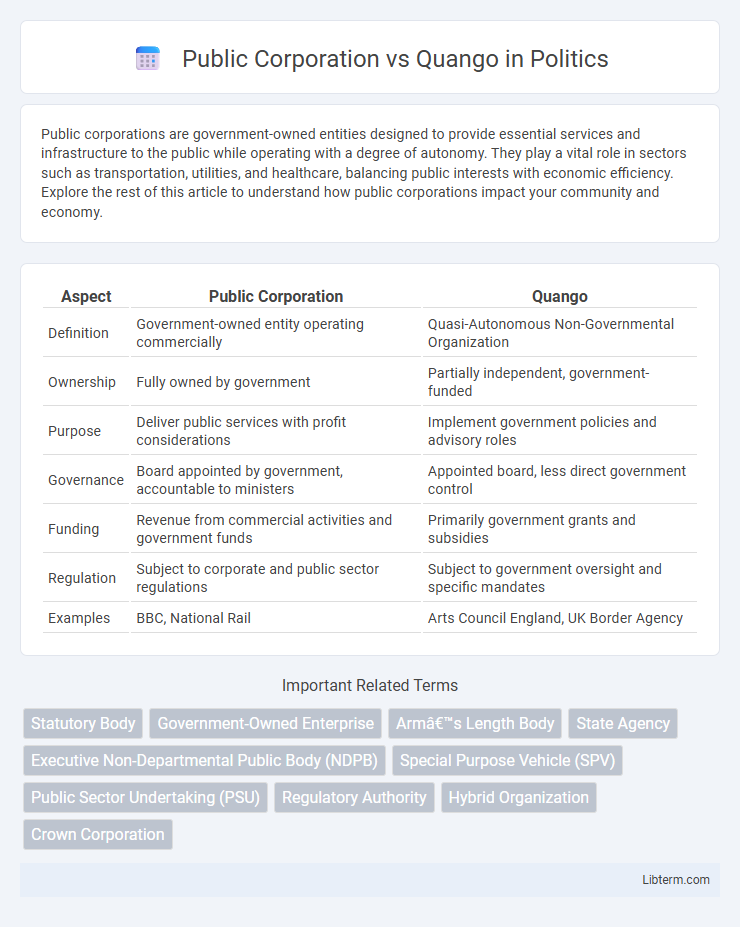Public corporations are government-owned entities designed to provide essential services and infrastructure to the public while operating with a degree of autonomy. They play a vital role in sectors such as transportation, utilities, and healthcare, balancing public interests with economic efficiency. Explore the rest of this article to understand how public corporations impact your community and economy.
Table of Comparison
| Aspect | Public Corporation | Quango |
|---|---|---|
| Definition | Government-owned entity operating commercially | Quasi-Autonomous Non-Governmental Organization |
| Ownership | Fully owned by government | Partially independent, government-funded |
| Purpose | Deliver public services with profit considerations | Implement government policies and advisory roles |
| Governance | Board appointed by government, accountable to ministers | Appointed board, less direct government control |
| Funding | Revenue from commercial activities and government funds | Primarily government grants and subsidies |
| Regulation | Subject to corporate and public sector regulations | Subject to government oversight and specific mandates |
| Examples | BBC, National Rail | Arts Council England, UK Border Agency |
Introduction to Public Corporations and Quangos
Public corporations are government-owned entities established to operate commercial activities while generating public revenue, often enjoying greater autonomy and a clear profit objective. Quangos, or quasi-autonomous non-governmental organizations, function as arms-length bodies funded by the government to deliver public services or implement policies without direct political control. Both entities serve distinct roles in public administration, with public corporations emphasizing business-like operations and quangos focusing on regulatory or advisory functions.
Defining Public Corporations
Public corporations are government-established entities that operate with a distinct legal identity, often formed to deliver public services or manage state assets while maintaining some operational independence. These organizations typically have a board of directors appointed by the government and are funded through a mix of government grants, commercial revenues, or public funding. Unlike quangos, public corporations possess greater autonomy in their financial and operational decisions, balancing public accountability with commercial objectives.
What is a Quango?
A Quango (Quasi-Autonomous Non-Governmental Organization) is a semi-independent body funded by the government but operates with significant autonomy to deliver public services or regulatory functions. Unlike traditional public corporations, Quangos typically have a mix of public and private sector characteristics, allowing for greater flexibility in decision-making and governance. Their roles often include regulatory oversight, policy advisory, or service delivery in sectors such as health, education, and environmental protection.
Key Differences Between Public Corporations and Quangos
Public corporations operate as state-owned enterprises with commercial objectives and financial independence, often generating revenue through goods or services, whereas Quangos (Quasi-Autonomous Non-Governmental Organizations) function primarily to execute governmental policies with significant public funding but limited commercial activities. Public corporations have a distinct management structure with boards focused on profitability and accountability to shareholders or the government, while Quangos are usually governed by appointed members responsible for regulatory or advisory roles without profit motive. The level of government control also differs, with public corporations enjoying operational autonomy, compared to Quangos' closer oversight and regulatory compliance requirements.
Governance Structures and Accountability
Public corporations operate under government-appointed boards with clear statutory mandates, ensuring transparency through formal accountability mechanisms such as parliamentary oversight and public reporting. Quangos, or quasi-autonomous non-governmental organizations, possess a hybrid governance structure that combines independent management with government influence, often leading to less direct political control but varied accountability standards. The distinction lies in the degree of operational autonomy and the nature of oversight, where public corporations face stricter regulatory frameworks and Quangos maintain flexibility in governance but sometimes lack comprehensive accountability measures.
Funding and Financial Management
Public corporations receive funding primarily through government budgets and generate revenue via commercial activities, maintaining a degree of financial independence while adhering to public sector financial regulations. Quangos (Quasi-Autonomous Non-Governmental Organizations) rely largely on government grants and subsidies, with less emphasis on revenue generation, leading to more direct governmental financial oversight and accountability. Effective financial management in public corporations focuses on balancing profitability with public service obligations, whereas quangos prioritize budget compliance and transparent allocation of public funds.
Roles and Functions in Public Service Delivery
Public corporations operate independently with commercial objectives while delivering public services, managing resources efficiently and generating revenue to cover operational costs. Quangos (quasi-autonomous non-governmental organizations) primarily function as government-funded bodies responsible for advisory, regulatory, or administrative tasks without direct commercial motives. Both entities play distinct roles in public service delivery, with public corporations emphasizing service provision and financial sustainability, whereas quangos focus on policy implementation, specialized oversight, and supporting government decision-making.
Advantages and Disadvantages of Public Corporations
Public corporations benefit from greater operational independence and the ability to generate revenue through commercial activities, providing flexibility in decision-making and reducing reliance on government funding. However, these entities may face challenges such as potential misalignment with public interest due to profit motives and less direct government control, which can impact accountability. The balance between autonomy and public responsibility remains a critical consideration in evaluating the overall effectiveness of public corporations compared to quangos.
Pros and Cons of Quangos
Quangos, or quasi-autonomous non-governmental organizations, offer the advantage of specialized expertise and operational flexibility while maintaining public accountability, allowing for efficient implementation of government policies. However, they often face criticism for potential lack of transparency, limited direct democratic oversight, and risks of bureaucratic inefficiency or political influence. The balance between autonomy and accountability remains a key challenge in evaluating the effectiveness of quangos compared to public corporations.
Choosing Between Public Corporations and Quangos: Factors to Consider
Choosing between public corporations and quangos involves evaluating factors such as governance structure, accountability, and funding sources. Public corporations typically operate with commercial objectives and greater autonomy, appealing to those seeking efficiency and financial self-sufficiency. Quangos, or quasi-autonomous non-governmental organizations, receive government funding and oversight, making them suitable for roles requiring public policy implementation and regulatory functions.
Public Corporation Infographic

 libterm.com
libterm.com